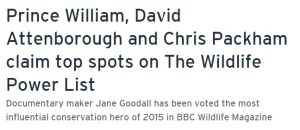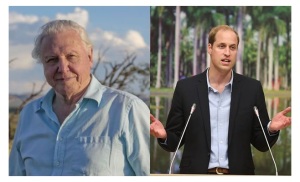Dear Radio Times …
There has been much controversy and discussion surrounding BBC Wildlife Magazine‘s “The Wildlife Power List” in this month’s issue – who should have been on there (but wasn’t), the ratio of females/males, the use of the word “Power”, the use of ranking rather than listing, etc etc.
Some people have written blog posts discussing it, others have written their own power/inspirational list. I may or may not write my own list. What I am writing today is related, but not aimed at BBC Wildlife Magazine. Rather a different magazine: Radio Times. They ran an article last week about the List, and I am rather annoyed by it. Read my e-mail to them below:
Dear Madam/Sir,
I congratulate you on including conservation news stories/a story on your website by writing about the BBC Wildlife Magazine’s “The Power List”. On the whole, conservation and nature are often ignored in the media; or worse, awful scare-mongering stories are the stock in trade (e.g. the majority of false black widow spider stories in 2014).
However, I am concerned by the content of the article in question. First, your main title lists three of the men included on the list. True, they are all well-known for their contribution to conservation and they are all high on the list. However, it is only in the short paragraph below that you mention the #1 on the list, Jane Goodall, who is female. I am confused about why the list’s winner is not featured in the title.
Second, and continuing on the main theme, your photos just below this are of David Attenborough and Prince William, who are both wonderful and inspiring; but again they are both male. Where is a photo of Jane Goodall?
Some people will say I am reading too much into this and you did this unintentionally. But this must have gone through various editorial decisions, so it can’t be unconscious. There is already an imbalance in the ratio of men to women in positions of power across society, and the same is true in conservation, STEM (Science, Technology, Engineering and Mathematics) as a whole and countless other areas. Their portrayal in the media is not just a symptom of this but is also a driver of it. Reams of evidence show that people’s attitudes and perceptions are, in part, affected by the media they consume. Your (perhaps unintentional, but I doubt it) portrayal of “The Wildlife Power List” is yet another example of this type of sexism, and I am very disappointed in the Radio Times as a result. I hope that you address this in future, and perhaps change the article as it currently stands.
Yours faithfully,
Ms Megan Shersby



Leave a Reply
Want to join the discussion?Feel free to contribute!